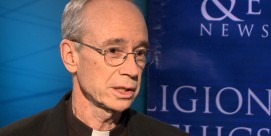In This Episode << SLIDE LEFT TO SEE ADDITIONAL SEGMENTS
William Martin on Billy Graham
Read Kim Lawton’s interview with Billy Graham biographer William Martin:
How significant is Billy Graham’s contribution to American evangelicalism?
I think it’s quite fair to say that that no one over the past 60 years has been more important to American evangelicalism than Billy Graham was. That he, when he first came on the scene in the early 1940s, it was a movement that was struggling, beleaguered. It had more power than many people thought, but after the Scopes trial, fundamentalism went into retreat, and it rebuilt itself between the two world wars. When it started to come out, there was a feeling that it might be something that was in the past. But Billy Graham, along with some other dynamic leaders, brought a great deal of energy and enthusiasm to evangelical Christianity through organizations, preeminently through Youth for Christ. [They] gave it fire, energy, optimism, vision, and then Billy Graham emerged from the pack as the outstanding representative of the movement. Through his crusades he gained national and international fame, but he did many other things besides that. He started CHRISTIANITY TODAY, which still is the flagship publication of evangelical Christianity, along with a number of other related publications under its umbrella. He organized international conferences that brought evangelical leaders from around the world together and helped them to develop this movement and to cooperate with each other and to enlarge the circle to include, for example, charismatics and Pentecostals, whom evangelicals had previously scorned. He went behind the Iron Curtain and made a more significant contribution, I think, than many people realize in breaking down the barriers to religious freedom in those areas through his own patient, polite way of working with the authorities rather than challenging them.
He has been criticized for that — that he wasn’t strong enough in speaking out against the Soviet Union.
At the time, when people criticized Billy Graham they said, “You are being used,” and he said, “I know we’re being used, but we’re also using them.” His approach in the former Soviet Union and the satellite states was to let people know that religious people are not a threat to the state: “There are more of them than there are communists. You do not want to oppress them. People in the West take religious freedom very seriously. You’re going to always have difficulty dealing with America, particularly if you oppress the religious rights of people.” Then, as his own freedom to preach and to publicize his meetings grew, he would tell the local people, “Now, you go to the ministers of religion here in charge of this and tell the state people in charge of religion, if you let an American Baptist do these things, surely you can let our own people do this.” Even people who criticized Mr. Graham at that time later acknowledged that his patience had played a role in encouraging a greater religious freedom. His role was more important there than many people believed. I truly believe that.
He has preached the same basic message for 50 years, but did his tone and style change?
Sure, his style changed greatly. If you look at some of the films and videos of his preaching, particularly in the late 1940s and on into the 1950s, he spoke at a rate that was gauged at something like 200 words a minute. He would walk a mile during his sermons, back and forth across the stage, with one of his assistants, Cliff Barrows, reeling in the microphone cord. And then the crucial change came in 1957 when he preached all summer in Madison Square Garden, packed the house pretty much every night for more than three months. ABC offered him a Saturday night slot to broadcast his crusade service live to the nation. For television, that style didn’t go over as well, and the medium reduced him down. He had to stay in one spot, and his oratorical style became cooler rather than hotter, as it had been previously. He became more conversational, as did the rhetorical style of politicians and others from that period. It’s a much more conversational sort of style than the revivalist oratory that was common earlier.
Did his theology mellow?
The theology changed somewhat, to be sure. He was much more of a literalist, or he actually went beyond the literal and would talk about what heaven would be like and what hell would be like — things that kept being brought up to him for the next 40 years. And he acknowledged that they embarrassed him somewhat. His theology always presented the basic invitation, the basic Christian message without going into the things that divided people. He was not interested in arguing about modes of baptism or things of that sort — things that divide many Christians. His great contribution, I think, was in bringing people together in a local area to cooperate with this general-purpose service without trimming his own message, but then leaving it up to churches to deepen and interpret that message in different kinds of ways.
That was problematic to many fundamentalist and evangelicals. Many people, many fundamentalists particularly, drew away from his ministry and refused to support it later because they thought he had become too liberal, too inclusive. He also showed, as he went along, as he traveled throughout the world, a greater appreciation for the strengths of other religions, even non-Christian religions.
How did he shape the perception evangelicals had of themselves?
Probably the first major impact that he had in that way was just the fact he was being given attention by TIME magazine, LIFE magazine, the Hearst newspapers, and then by pretty much everyone as a result of that. Here was a prominent young preacher of their own kind who was being paid attention to by the nation’s major media. That in itself provided a kind of legitimation. A second and perhaps ultimately even more important step was his association with the presidents — with Dwight Eisenhower, a little bit with John Kennedy, certainly with Lyndon Johnson, and most famously with Richard Nixon, but also with presidents since that. To think that one of our own, now the spokesman for our movement, the best known evangelical in the world, is also walking in the corridors of power, that he is friends with the most powerful men in the world, and he visits with powerful people of other kinds in other parts of the world — that again provided evangelicals themselves with a legitimation of their movement. In turn, of course, it provided those presidents with quite valuable legitimation, and they understood that — that to be associated with Billy Graham made them and their programs at least have the suspicion of being upright, righteous, perhaps even Christian, and that was a powerful help to them.







